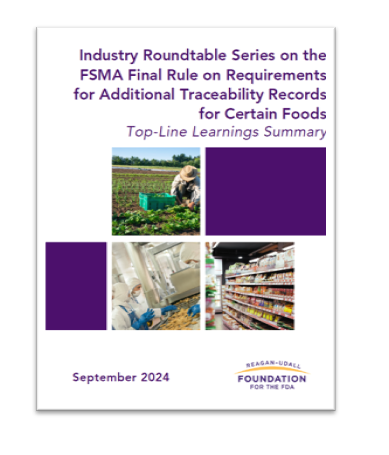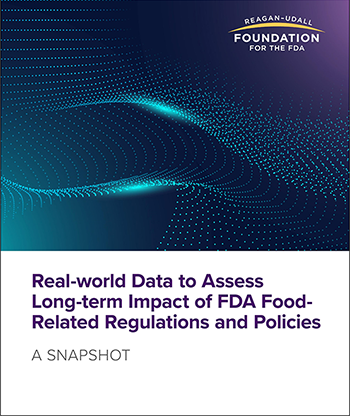Food plays a significant role in public health, from the quality and safety of the food supply to the nutrition it provides. Nutrition-related chronic diseases, such as heart disease and cancer, are the leading cause of death and disability in the United States. Nearly one in three adults in the U.S. have high blood pressure, which can lead to heart disease and strokes, and 13 percent have diabetes. A staggering 70 percent of U.S. adults are overweight, with roughly 40 percent classified as obese. Among children and adolescents, almost one in five are obese. Roughly half of all American adults have at least one preventable chronic disease, many of which are related to poor quality eating patterns.
The Reagan-Udall Foundation for the FDA's work supports FDA’s advancement of the Nutrition Innovation Strategy, promotes actions to reduce preventable death and disease related to poor nutrition. The Foundation is engaging with stakeholders -- including regulators, consumers, and industry -- to further food system strategies that foster industry innovation and change in consumer behavior.
Given the link between nutrition and chronic disease, it is increasingly important to provide consumers, especially those who are food insecure, with access to nutritious food as well as the resources they need to make healthy food decisions. We hope to help reduce health disparities by empowering consumers with information and facilitating industry innovation toward healthier foods that consumers want. Nutrition experts agree that the ability to obtain, comprehend, and apply nutrition information has a huge impact on an individual’s health, and ultimately, on America's public health.
The Reagan-Udall Foundation for the FDA is leading a stakeholder dialogue process to explore new strategies for produce safety and the development of a collaborative public-private partnership (PPP). Ensuring the safety of fruits and vegetables requires a holistic approach. To aid in the goal of improved protection of public health and establishing a PPP, the Foundation is collaborating with stakeholders from agricultural communities, industry, academia, and government to develop a shared understanding of the challenges and a vision for protecting public health.
Over a three month period, the Foundation solicited perspectives, interest, and volunteers via a short questionnaire. Responses submitted are helping guide next steps.
The FDA final rule on Requirements for Additional Traceability Records for Certain Foods establishes new traceability recordkeeping requirements for persons who manufacture, process, pack, or hold foods included on the Food Traceability List (FTL). The compliance date for the final rule is January 20, 2026.
At FDA's request, In 2024 the Foundation convened a three-part series of virtual, invitation-based roundtable conversations with covered entities actively working on the implementation of the Food Traceability Final Rule. (The new requirements identified in the final rule are intended to allow for faster identification and rapid removal of potentially contaminated food from the market, resulting in fewer foodborne illnesses and/or deaths.) The rule affects domestic and foreign firms producing food for U.S. consumption along the entire food supply chain in the farm-to-table continuum. These firms may need to seek new systems and new processes. Bringing together those actively implementing the rule, the roundtables facilitated cross-sector dialogue to document and prioritize implementation concerns, provide opportunities for shared learning, and discuss solutions. At the completion of the series, the Foundation published a summary of shared learnings. In 2025, the Foundation will convene an additional roundtable conversation and webinar to foster collaboration and innovation across key sectors. Click here to view our 2024 public meeting.
The Food and Drug Administration (FDA) has responsibility for ensuring a safe and promoting a wholesome food supply, with mandates in nutrition and food safety. Regulations and policies are foundational elements of these mandates, and the purpose of this initial phase of this project (the Food Evidence Generation Project) was to illustrate the availability of real-world data across the food supply chain to help assess the impact of food safety and nutrition regulations and policies on consume. (This insight can then help inform future FDA action.)
With leadership from an expert working group, interviews were conducted with representatives from 27 companies across the food supply chain to understand types of data available within each sector to generate evidence of consumer behavior change or company action in response to FDA action.

Consumer and patient advocacy, government, and industry groups focus on amplifying fundamental nutrition messages through the Foundation's Nutrition Communications Network. Their goal: broadly disseminate coordinated nutrition messages to those most at risk for nutrition-related chronic disease.
The Network shares social media messages, posts blog articles, links to key resources, and connects to timely topics -- like seasonal offerings or national observances. To coordinate the effort, the Foundation publishes message guides that highlight educational resources ranging from FDA’s Interactive Nutrition Facts label to curricula for school teachers, health educators, and health providers. Compiling easy-to-use, science-based messages from the most credible sources, such as FDA, Dietary Guidelines for Americans 2020-2025, USDA's MyPlate program, and National Institutes of Health, the guide is used by a growing number of organizations both locally and nationally.
Check out a sample message guide, and then let us know if you’d like to learn more about joining the network.
See a sample Message Guide
Email us to learn more about the Nutrition Communications Network

When's the last time you looked at the Nutrition Facts label while shopping or preparing a meal? You may want to flip the package over to check out the recent updates that make it easier for you to make informed choices for lifelong healthy eating habits.
FDA recently updated the label to help consumers more readily identify calorie and serving size information, see the amount of added sugars, and track key nutrients such as Vitamin D and Potassium on packaged foods and drinks. The Foundation is partnering with FDA to increase awareness and use of the label, which has changed based on updated scientific information, new nutrition research, and input from the public.
FDA's The New Nutrition Facts Label: What’s in it for You? campaign provides lots of detail on how to use the label in your daily eating. And, they even have fun games to help kids learn to develop healthy habits.
Learn more about the Nutrition Facts label

Many Americans plan to continue their focus on health and wellness even as the country begins to reopen and COVID-19 mandates continue to evolve.
Retail dietitians are essential to helping Americans make healthier choices that promote wellness and help prevent or manage chronic disease. That's why the Foundation partnered with the Retail Dietitians Business Alliance (RDBA), now the ARC Health & Wellness Community, to produce "Supporting Healthier Eating in the New Normal: The Ultimate Retail Dietitian Toolkit."
Informed by a listening session with RDBA member dietitians, the Toolkit provides ready-to-share messages and resources to support consumer engagement in nutrition education. Tools include fast facts for social media, infographics, online quizzes, cook a-longs, and lots of other resources grounded in evidence-based science. Retail dietitians can tailor the messages to their brand and the needs of their consumers.



